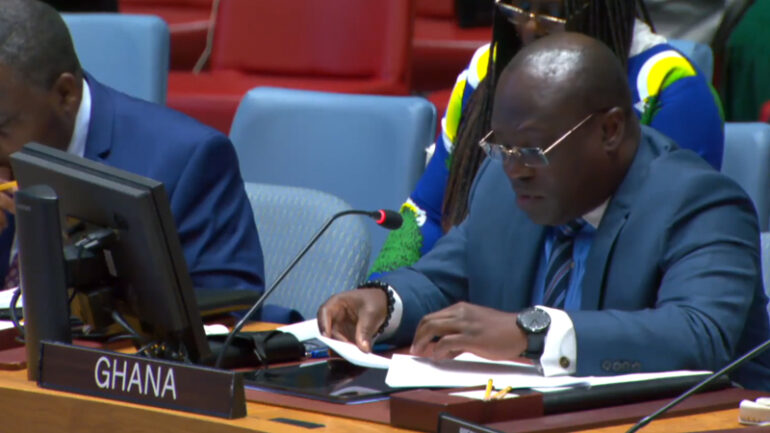UN Security Council Open meeting on the situation of Human Rights in the DPRK

Ambassador Harold Agyeman
Ghana’s Representative to the United Nations
Security Council Chamber
United Nations, New York
August 17 2023
Madam. President,
I begin by noting the objectives for this meeting and reaffirm Ghana’s support for the human rights pillar of the work of the United Nations. We thank the briefers for their perspectives and encourage the further efforts of relevant United Nations bodies in helping the DPRK to fully fulfil its obligation to promote and protect the rights of its citizens. In this regard, we welcome the work of UN human rights mechanisms on the DPRK and appreciate their efforts to raise awareness on the gaps needed to be addressed to ensure full respect for the human rights of the people of the DPRK. We support the work of the Special Rapporteur on the situation of human rights in the DPRK and would continue to constructively engage within the Third Committee of the General Assembly on the situation of human rights in that country.
Madam President,
As we commemorate the 75th Anniversary of the Universal Declaration on Human Rights, we underscore the importance of respect for the entire spectrum of human rights, in upholding the dignity of all persons and for the progress and stability of societies. We emphasise the need for human rights issues not to be politicised and for equal attention to be given to economic, social and cultural rights, as is given to civil and political rights. This is important to sustain peace across the globe. This year also marks the 70th anniversary of the Korean Armistice. The
commemoration should spur us all on to foster peace and promote reconciliation. Securing the reunion of separated families is one way of building trust among the Korean people and can also play an important role in promoting reconciliation, peace and stability on the Korean Peninsula and the region in general. We therefore encourage the DPRK and the Republic of Korea to prioritise work on finding ways to resume reunions, online or offline.
We appeal to the authorities of the DPRK to release and return the 17 Japanese nationals officially recognized by the Government of Japan as having been abducted by the DPRK. We further call on the DPRK authorities to provide the families of all persons who have been abducted, or otherwise considered as forcibly disappeared, with full information on their fate and whereabouts if they have survived, and allow those who remain alive, and their descendants, to return immediately to their countries of origin and, in close cooperation with their families and nations of origin,
identify and repatriate the physical remains of those who have died.
Madam President,
Ghana notes the increasing challenges of gathering independent and credible information on the situation of human rights in the DPRK since the outbreak of the COVID-19 pandemic. We urge a constructive engagement between the DPRK and United Nations to support efforts in assuring the human rights of its nationals and addressing the growing humanitarian needs. While concerned by the human rights and humanitarian situation in the DPRK, we firmly hold the view that country specific human rights questions should be dealt with by the relevant UN human rights bodies, with the narrow and limited exception being instances that a systematic and widespread violation of human rights aggravates an ongoing conflict situation and where State authorities are either incapable or unwilling to address the matter as verified from independent sources.
We therefore express reservations on the Council’s further consideration of this matter and urge the appropriate UN human rights bodies and mechanisms with existing mandates to continue to gather all available information and data and report on the human rights situation of the North Korean people. In conclusion Ghana reiterates her support for the human rights pillar of the work of the United Nations and encourage global respect for human rights and the fundamental freedoms of all persons without distinction as to race, sex, language or religion, as called for by article 1 (3) of the United Nations Charter.
I thank you for your attention.
